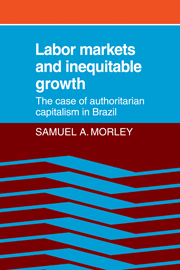Book contents
- Frontmatter
- Contents
- List of tables and figures
- Preface
- Part I Growth, employment creation, and inequality in Brazil
- Part II The effect of supply and demand on labor markets during rapid economic growth
- 6 Migration and the modernization of the agricultural labor force
- 7 The absorption of migrants into the urban economy
- 8 Trends and theories of the wage differential during economic growth
- 9 The market for skilled labor
- 10 Agriculture, wage policy, and the wages of unskilled labor
- 11 Additional perspectives on inequitable growth in Brazil
- 12 Conclusions
- Data appendix
- Bibliography
- Index
- Frontmatter
- Contents
- List of tables and figures
- Preface
- Part I Growth, employment creation, and inequality in Brazil
- Part II The effect of supply and demand on labor markets during rapid economic growth
- 6 Migration and the modernization of the agricultural labor force
- 7 The absorption of migrants into the urban economy
- 8 Trends and theories of the wage differential during economic growth
- 9 The market for skilled labor
- 10 Agriculture, wage policy, and the wages of unskilled labor
- 11 Additional perspectives on inequitable growth in Brazil
- 12 Conclusions
- Data appendix
- Bibliography
- Index
Summary
Brazil represents a fairly extreme approach to economic development. Its was a strategy of trickle-down growth, in which profit incentives were generous, in which wages were held back, and in which a cooperative alliance between private enterprise and the state ensured a propitious environment for capitalist development. No obstacle, not even the democratic system itself, was allowed to stand in the way of the overriding goal of economic growth. How did this experiment with growth under authoritarian capitalism work out in practice?
The general consensus has been that, although the Brazilian strategy did lead to rapid growth for a time, there was precious little trickle-down of benefits to the poor. Indeed many have claimed that the trickle went in the other direction. This argument is, I think, largely wrong. Growth did lead to a significant expansion of employment and income for workers at all levels of skill and income. This is particularly true of the miracle period when the trickle-down growth strategy was practiced in its purest form. Job creation in the formal sector kept up with the expansion in the labor force and the influx of rural migrants, most of whom found formal-sector jobs rather than makework activities in the informal sector. Newly created jobs tended to be relatively good ones, allowing for a substantial improvement in the average occupational status of the Brazilian labor force. The evidence consistently supports the conclusion that trickle-down growth was a successful employment strategy.
The evidence is equally compelling that inequality increased during the trickle-down period. There has been a good deal of controversy over the causes of this unfortunate trend and the conclusions and lessons that should be drawn from it.
- Type
- Chapter
- Information
- Labor Markets and Inequitable GrowthThe Case of Authoritarian Capitalism in Brazil, pp. 285 - 293Publisher: Cambridge University PressPrint publication year: 1983



